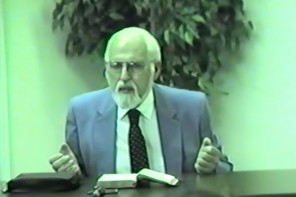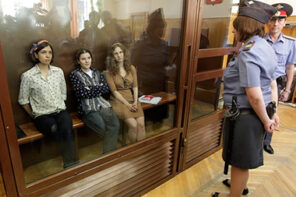Last weekend, 25-year-old Mikhail Yakovlev was nearly arrested for his involvement in an unsanctioned zombie flash mob in the Russian city of Omsk. This echoes an incident last May in which a “zombie walk’ in Moscow resulted in arrests for public indecency. The world’s first zombie walk was organized by Thea Felds (aka Thea Munster) of Toronto, Canada, in 2003. In the last decade zombie walks have become an international phenomenon. Last November, nearly 10,000 people assembled in Mexico City to imitate the living dead, though Russia has attempted to suppress the spreading zombie phenomenon.
Yakovlev received permission from the city to organize a “Zombie Parade” earlier this summer, but his permit was revoked. It is not entirely clear why the city decided to shut down the zombie parade, but it appears to have been in response to a coalition of religious groups and moral entrepreneurs. The local Russian Orthodox diocese complained that “raising the dead” is un-Christian. (The irony of this claim was apparently lost on everyone). The city’s Muslim leaders objected that the zombie parade would occur during the end of Eid ul Fitr and might interfere with the festivities. Meanwhile a group called “Parental Control” claimed that having too many young people in one place would lead to criminal activity, while other groups said that seeing a zombie parade would permanently traumatize children.
All of this came shortly on the heels of the recent conviction of members of the feminist art collective/punk band Pussy Riot. In February, the group performed an obscenity-laden song in a Moscow cathedral to protest the Putin administration and were charged with “hooliganism.” However, in Russia, as in the United Kingdom and some other countries, crimes may carry heavier sentences if they are deemed “religiously aggravated.” Because their disruptive performance was deemed to have been “motivated by religious hatred,” the band members were sentenced to two years in prison.
Zombie walks have occurred all over the world. Why is it that in Russia they are regarded as threatening and socially subversive? One factor is that Yakovlev organized demonstrations against election results last December, causing police to perceive him as a radical. However, the pressure to stop the Zombie Walk was not framed as a political action but as a threat to religious sensibilities. As Donovan Schaefer noted in the sentencing of Pussy Riot, there is a “synchronization of interests” between the political and religious status quo. The enemies of the church are the enemies of the state and vice versa.
So why arrest zombies? Why claim that the risen dead are “un-Christian?” Perhaps zombies are threatening to such a regime because they are, as Derrida noted, “an undecidable”; they are neither alive nor dead. They run roughshod over the most fundamental categories that order our world. This makes them an inherent symbol of anarchy and the antithesis of social order. A world full of zombies is a world in which neither the church nor the state can impose its will. Yakovlev intended his Zombie Parade as a recreational event. But zombies, it seems, are always political.



